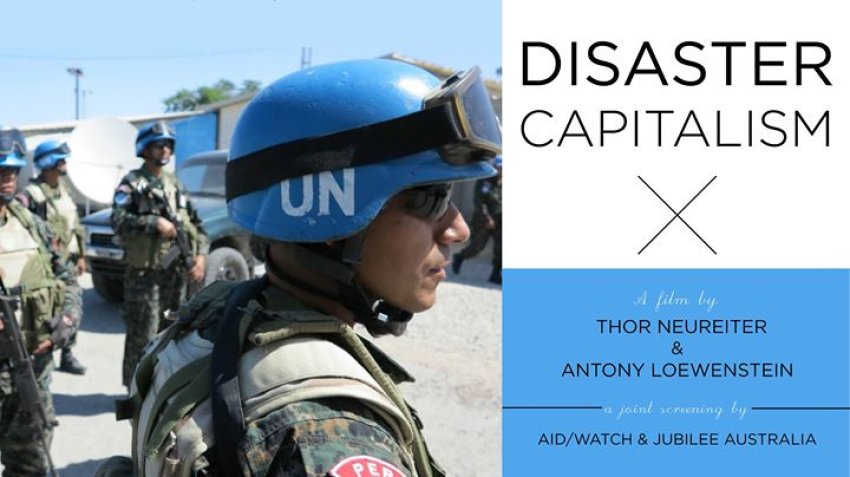
Disaster Capitalism
Written by Antony Loewenstein
Directed by Thor Neureiter
www.disastercapitalismfilm.com
Disaster Capitalism is a groundbreaking documentary film about Bougainville, Haiti and Afghanistan, revealing the dark underbelly of the global aid and investment industry. The film offers important insights into a secret multi-billion dollar world by investigating how aid money is actually spent — or misspent.
Prominent journalist and author Antony Loewenstein joins award-winning filmmaker Thor Neureiter on a four-year journey through the world of shady mining companies, corrupt and failing governments and resilient local communities.
Narrated by Loewenstein, the film takes us to war-torn Afghanistan to interview leading community figures struggling to defend local village residents against the depredations of overseas mining companies. He reveals the startling fact that the US has spent more on so-called “development aid” in Afghanistan over the past 15 years than it did on the entire post-World War II Marshall Plan to reconstruct a devastated Europe.
Despite this huge sum, Afghanistan remains a failed, corrupt state, riven by an endless war with the reactionary Taliban. The great majority of its people live in dire poverty and insecurity.
Speaking at a showing of the film at the Edmund Rice Centre on November 14, refugee rights activist Phil Glendenning noted the Afghan government still spends half of its national budget on defence and security. Yet the ongoing violence still leaves people desperate for peace.
In Haiti, the film shows the terrible aftermath of the 2010 earthquake and the failure of UN and other foreign aid to significantly improve the conditions for the poor majority. Thousands died because of dysentery introduced to the country by UN personnel.
Instead of using aid to re-develop destroyed public infrastructure, the US and other rich countries focused on setting up free-trade zones to further exploit local workers with encouragement from corrupt Haitian politicians.
Loewenstein also visits Bougainville, currently a province of Papua New Guinea, which was ravaged by a long civil war in which a reported 20,000 people were killed. The war was launched by the PNG government, with the full backing of Australia, when local people rose up against the destruction of their island by mining giant Rio Tinto in the 1980s.
We hear the voices of independence leaders and local women villagers, who express a desire to control their own affairs as a precondition to any new resource projects being initiated.
The film is partly based on Loewenstein’s 2015 book Disaster Capitalism: Making a Killing Out of Catastrophe. For the book, Loewenstein travels across Afghanistan, Pakistan, Papua New Guinea, the US, Britain, Greece and Australia to witness the reality of rampant capitalism. He discovers how companies cash in on organised misery in the hidden world of privatised detention centres, militarised private security, aid profiteering and destructive mining.
Loewenstein concludes the film by stating: “In the end, the solution lies with the people and communities.”
Disaster Capitalism starkly exposes the reality of big business and its agents in utilising natural and human-made calamities for greed and profit. It ends on a hopeful note that communities which suffer this exploitation are beginning to rise up and demand their right to democracy and real development in the future.